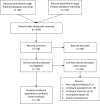Prognostic value of systemic immune-inflammation index in patients with urologic cancers: a meta-analysis
- PMID: 33061851
- PMCID: PMC7552553
- DOI: 10.1186/s12935-020-01590-4
Prognostic value of systemic immune-inflammation index in patients with urologic cancers: a meta-analysis
Abstract
Background: Several studies have reported that the systemic immune-inflammation index (SII) is associated with the prognosis of patients with urologic cancers (UCs). The aim of this study was to systematically evaluate the prognostic value of SII in UC patients.
Methods: We searched public databases for relevant published studies on the prognostic value of SII in UC patients. Hazard ratios (HRs) and 95% confidence intervals (CIs) were extracted and pooled to assess the relationships between SII and overall survival (OS), progression-free survival (PFS), cancer-specific survival (CSS), overall response rate (ORR) and disease control rate (DCR).
Results: A total of 14 studies with 3074 patients were included. From the pooled results, we found that high SII was associated with worse overall survival (OS) in patients with UC (HR 2.58, 95% CI 1.59-4.21). Patients with high SII values also had poorer PFS (HR 1.92, 95% CI 1.29-2.88) and CSS (HR 2.58, 95% CI 1.36-4.91) as well as lower ORRs (HR 0.40, 95% CI 0.22-0.71) than patients with low SII values. In addition, the subgroup analysis of OS and PFS showed that the prognosis of patients with high SII was worse than that of patients with low SII.
Conclusions: SII might be a promising noninvasive predictor in patients with UC. However, more samples and multicenter studies are needed to confirm the effectiveness of SII in predicting the prognosis of patients with UC.
Keywords: Meta-analysis; Prognosis; Systemic immune-inflammation index (SII); Urologic cancer.
© The Author(s) 2020.
Conflict of interest statement
Conflict of interestsWe declare that we have no conflict of interest.
Figures
Similar articles
-
Preoperative systemic immune-inflammation index as a prognostic indicator for patients with urothelial carcinoma.Front Immunol. 2023 Nov 20;14:1275033. doi: 10.3389/fimmu.2023.1275033. eCollection 2023. Front Immunol. 2023. PMID: 38053997 Free PMC article.
-
High systemic immune-inflammation index predicts poor prognosis and response to intravesical BCG treatment in patients with urothelial carcinoma: a systematic review and meta-analysis.Front Oncol. 2023 Nov 1;13:1229349. doi: 10.3389/fonc.2023.1229349. eCollection 2023. Front Oncol. 2023. PMID: 38023187 Free PMC article.
-
Systemic immune-inflammation index is a promising non-invasive biomarker for predicting the survival of urinary system cancers: a systematic review and meta-analysis.Ann Med. 2021 Dec;53(1):1827-1838. doi: 10.1080/07853890.2021.1991591. Ann Med. 2021. PMID: 34647517 Free PMC article.
-
The prognostic value of systemic immune-inflammation index in surgical esophageal cancer patients: An updated meta-analysis.Front Surg. 2022 Aug 26;9:922595. doi: 10.3389/fsurg.2022.922595. eCollection 2022. Front Surg. 2022. PMID: 36090319 Free PMC article. Review.
-
Prognostic value of pretreatment systemic immune-inflammation index in patients with gastrointestinal cancers.J Cell Physiol. 2019 May;234(5):5555-5563. doi: 10.1002/jcp.27373. Epub 2018 Oct 23. J Cell Physiol. 2019. PMID: 30353545
Cited by
-
Comparison of PIV and Other Immune Inflammation Markers of Oncological and Survival Outcomes in Patients Undergoing Radical Cystectomy.Cancers (Basel). 2024 Feb 3;16(3):651. doi: 10.3390/cancers16030651. Cancers (Basel). 2024. PMID: 38339402 Free PMC article.
-
The effect of the systemic immune-inflammatory index on the no-reflow phenomenon in patients undergoing saphenous vein intervention.Postepy Kardiol Interwencyjnej. 2024 Jun;20(2):148-156. doi: 10.5114/aic.2024.140259. Epub 2024 Jun 4. Postepy Kardiol Interwencyjnej. 2024. PMID: 39022716 Free PMC article.
-
Peripheral blood immunoinflammatory biomarkers: prospective predictors of postoperative long-term survival and chronic postsurgical pain in breast cancer.Front Immunol. 2025 Jan 29;16:1531639. doi: 10.3389/fimmu.2025.1531639. eCollection 2025. Front Immunol. 2025. PMID: 39944700 Free PMC article.
-
Deciphering the efficiency of preoperative systemic-immune inflammation related markers in predicting oncological outcomes of upper tract urothelial carcinoma patients after radical nephroureterectomy.Investig Clin Urol. 2025 May;66(3):194-206. doi: 10.4111/icu.20250044. Investig Clin Urol. 2025. PMID: 40312899 Free PMC article.
-
Prognostic Significance of Systemic Inflammation Markers in Testicular and Penile Cancer: A Narrative Review of Current Literature.Life (Basel). 2023 Feb 21;13(3):600. doi: 10.3390/life13030600. Life (Basel). 2023. PMID: 36983756 Free PMC article. Review.
References
-
- Gilbert SM, Wood DP, Dunn RL, et al. Measuring health-related quality of life outcomes in bladder cancer patients using the Bladder Cancer Index (BCI) Cancer-Am Cancer Soc. 2007;109(9):1756–1762. - PubMed
Publication types
LinkOut - more resources
Full Text Sources



